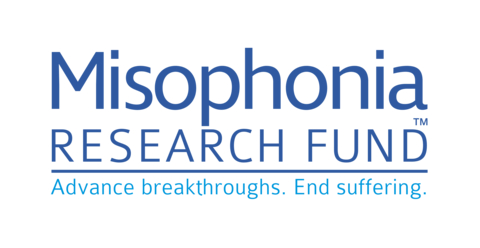Misophonia Research Fund Announces Groundbreaking Research Investment of $12M+: Welcomes New Cohort of Grantees and Launches New Seed Data Grant
Misophonia Research Fund Announces Groundbreaking Research Investment of $12M+: Welcomes New Cohort of Grantees and Launches New Seed Data Grant
CHICAGO--(BUSINESS WIRE)--The Misophonia Research Fund (MRF), an initiative of the REAM Foundation, announces the success of its ongoing dedication to driving innovative and impactful misophonia research with $12+ million in total research investment thus far, and an additional $2.5 million in research commitment with its latest batch of grant recipients. In line with its mission to support scientific breakthroughs, the MRF’s investment has led to significant progress in understanding misophonia, a disorder characterized by decreased tolerance and strong negative emotional, physiological, and behavioral reactions to specific “trigger” sounds.
This year marks a pivotal moment for misophonia research as projects funded through the MRF have contributed to a deeper understanding of the neurological and psychological mechanisms behind the condition. Several of these studies are already informing the development and standardization of new diagnostic tools and potential therapeutic approaches. Demonstrating the MRF’s position as catalyst in the field of misophonia, 45 MRF-funded peer-reviewed papers on misophonia have been published since the MRF’s founding in 2019 – representing ~20% of all current scientific literature on misophonia.
"Misophonia is a disorder that has long been misunderstood and under-researched, leaving many affected individuals without adequate answers or support," said Lauren Harte-Hargrove, Executive Director of the MRF. "Through our dedicated funding efforts, the efforts of our partners, and our alliance with those impacted by misophonia, we are now making meaningful strides toward addressing this gap. The breakthroughs our grantees have made underscore the importance of continued investment in misophonia research, and we’re thrilled to support the next wave of researchers in this burgeoning field."
New Research Investigating Misophonia
Today, the MRF announces its latest cohort of eight grant recipients, which join 32 previously awarded scientific projects dedicated to building a fundamental understanding of misophonia and supporting the development of diagnostic tools and therapeutic interventions. The newly funded projects will span a wide range of disciplines, including neuroscience, genetics, psychology, audiology, and clinical research, ensuring a comprehensive approach to tackling the complexities of misophonia.
"We are excited to support such an outstanding group of researchers who are pushing the boundaries of what we know about misophonia," said Diane Miller, Co-Founder of the MRF. "Their innovative approaches and dedication to solving this complex condition offer hope to the multitude of individuals worldwide who suffer from misophonia."
2024 Misophonia Research Impact Grant recipients:
- University of California Santa Cruz, where Nicolas Davidenko, PhD, will extend his previous MRF-funded work to examine the role of mental imagery in reducing distress in reaction to trigger sounds.
- Duke University, where Ashley Moskovich, PhD, aims to determine the prevalence and incidence of misophonia in the United States, as well as whether misophonia symptom severity changes over time.
- Icahn School of Medicine at Mount Sinai, where postdoctoral research fellow Parul Jain, PhD, will conduct research to examine the impact of Transcranial Magnetic Stimulation on symptoms of misophonia.
- Mass Eye and Ear, where postdoctoral research fellow Samuel Smith, PhD, will conduct research aimed at determining psycho-physiological indicators of misophonia, providing a publicly available analysis toolkit.
- University of Sussex, where Giulia Poerio, PhD will examine the impact of Transcutaneous Vagal Nerve Stimulation on symptoms of misophonia.
- Tel Aviv University, where Tami Bar-Shalita, PhD, is partnering with Rachel Kizony, PhD, at the University of Haifa to create a framework to understand sensory, cognitive and emotional aspects of misophonia.
- Vanderbilt University Medical Center, where Tiffany Woynaroski, PhD, will investigate early biological and behavioral markers of sound intolerance.
- Yale University, where Thomas Fernandez, MD, aims to advance our understanding of the genetic risk factors and biological pathways underlying misophonia.
These grantees will receive a combined total of $2.5M in funding, with projects expected to span 2-3 years. Through their work, the MRF hopes to accelerate the path to effective treatments and improve the quality of life for those living with misophonia.
Visit the MRF website for more information about MRF-funded research.
Announcing the Opening of the 2025 Request for Research Proposals and Launch of Seed Funding Mechanism
Calls for the 2025 MRF funding cycle are open. In addition to its $200,000-$500,000 Misophonia Research Impact Grant mechanism, the MRF announces the launch of the $75,000 Misophonia Data Discovery Grant mechanism to support the acquisition of datasets to seed larger projects. Established investigators, postdoctoral researchers, and graduate students dedicated to advancing a world where misophonia is scientifically understood and effectively treatable are encouraged to apply. Deadlines for submission can be found at https://www.misophoniaresearchfund.org/.
About the Misophonia Research Fund
The Misophonia Research Fund (MRF) is focused on advancing scientific breakthroughs and ending suffering from misophonia. MRF was launched in 2019 with an inaugural round of funding for medical research grants that seek to better understand misophonia, diagnose people who have the condition, and assess treatment strategies. MRF is an initiative of The REAM Foundation, a private family foundation. Through a competitive grants program, MRF seeks to foster innovative science and new treatments for misophonia. For more information, visit misophoniaresearchfund.org.
Contacts
Lauren Harte-Hargrove, PhD
Executive Director | Misophonia Research Fund
847-883-9947
info@misophoniafund.org

